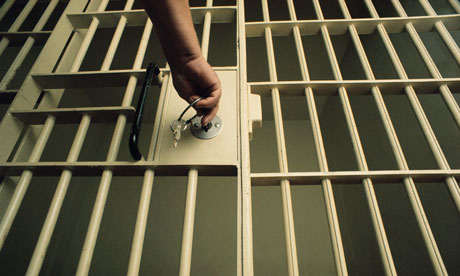
Thousands of children held in police cells overnight
Charity calls for stop to ‘evil practice’ of detaining under 16s for minor offences which causes trauma to the child
Parents Against Injustice
Charity calls for stop to ‘evil practice’ of detaining under 16s for minor offences which causes trauma to the child

Thousands of children under 16 are being held overnight in police cells every year, figures reveal.
At least 53,000 children under the age of 16 were held overnight in police cells in 2008 and 2009, including 13,000 children aged between nine and 13, according to figures obtained by the Howard League for Penal Reform from half the police forces in England and Wales. The charity called the practice “evil” and urged that it be stopped.
Channel 4 News, which will report on the research on Tuesday, discovered those detained overnight in cells included a 16-year-old girl arrested for stealing a can of lager and a girl of 13 who stole a make-up bag.
Nine of the children detained between 2008 and 2009 were under the age of criminal responsibility, which is 10 in England and Wales. There were 1,674 children aged 10 or 11; an age group covered by legal safeguards designed to limit the likelihood of them being detained overnight. Almost 11,500 were children under 14, the European average age of criminal responsibility.
“I was horrified to discover how prevalent the practice is across the country. Thousands of children are detained for at least one night in police cells ever year,” said Frances Crook, the director of the Howard League. “A police cell is not an appropriate place for children. This is an evil practice and must stop.”
Crook said she feared the actual numbers might be much higher. Although the charity asked all 43 police forces in England and Wales for figures under freedom of information rules, only half responded. The Metropolitan police were among the forces which refused to release data.
“We may actually be talking hundreds of thousands of children detained overnight each year,” said Crook.
The FoI requests reveal that the practice varies wildly across the country. Greater Manchester police held nearly 4,000 girls and nearly 13,000 boys for the night in its police cells in a year. Kent police held 2,700 boys and girls overnight. Nottinghamshire held 1,300. Norfolk, however, only held 122 children overnight in the same year.
Crook said most children detained are not serious offenders. “It appears children are being held in police cells for child protection reasons, for example when a child is found in the street drunk. This could be an increasing response to children in need as local authorities face cuts to children’s services,” she said. “We’re dealing with children who are in need.”
Anita Dockley, research director for the charity, blamed failures in the referral process from police custody to local authority accommodation. “This referral process is a vital safeguard for children who are charged and whose bail is refused by the police. But police admitted to us that requests by them for local authority accommodation are often not met.”
This is, she pointed out, contrary to international law, which states that “no child should be deprived of his or her liberty unless it is a measure of last resort”.
Some police forces admit concern over the numbers and are trying alternative approaches. In 2006, Hull was third in a national league table of local authorities sending children under the age of 18 to custody. But it had little impact on re-offending, said commander Keith Hunter of Hull police. He introduced full time youth justice workers into his police custody suite. Now in its third year, the scheme steers away from the criminal justice system through age-appropriate alternatives, including counselling, supported return to school, anger management and alcohol awareness training. The programme has halved the number of child detentions in Hull.
Other figures support Crook’s claim that children are being unnecessarily arrested and detained. At least a quarter of a million children were arrested last year – including 22,135 aged 10 to 13 – but only 81,500 were sentenced by a court and only 4,200 were sentenced to custody. This, said Crook, “suggests that for two thirds of children who are put through the trauma and indignity of an arrest and detention in a police station, it was unnecessary”.
Andy Adams, speaking for the Association of Chief Police Officers, said: “As with adults, detention of children in custody is authorised for a number of reasons, including to further a criminal investigation, to uncover the identity of any suspects or because the disappearance of that person would hinder any prosecution. The rules for the detention of suspects are set down in law and on every occasion must be authorised by a custody officer.
“Detentions of both children and adults in police custody are reviewed regularly to ensure that they are being held in accordance with the law and not for any longer than required for police investigations.”
http://www.guardian.co.uk/society/2011/jun/13/thousands-children-he...
© 2024 Created by Alison J Stevens.
Powered by
![]()
You need to be a member of Parents Against Injustice to add comments!
Join Parents Against Injustice